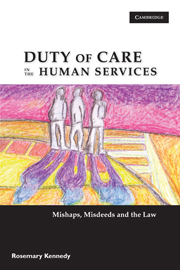Book contents
- Frontmatter
- Dedication
- Contents
- Acknowledgements
- Author's note
- Part 1 Positioning and mapping the territory of human service mishaps and misdeeds
- Chapter 1 The shadow world
- Chapter 2 Ideals, actors and actions
- Part 2 Mishaps and misdeeds through a law lens
- Part 3 Mishaps and misdeeds through a human services lens
- Part 4 Mishaps and misdeeds through a unified lens
- Appendix: Finding the law and cases
- References
- Index
Chapter 2 - Ideals, actors and actions
from Part 1 - Positioning and mapping the territory of human service mishaps and misdeeds
Published online by Cambridge University Press: 05 June 2012
- Frontmatter
- Dedication
- Contents
- Acknowledgements
- Author's note
- Part 1 Positioning and mapping the territory of human service mishaps and misdeeds
- Chapter 1 The shadow world
- Chapter 2 Ideals, actors and actions
- Part 2 Mishaps and misdeeds through a law lens
- Part 3 Mishaps and misdeeds through a human services lens
- Part 4 Mishaps and misdeeds through a unified lens
- Appendix: Finding the law and cases
- References
- Index
Summary
WHO AND WHAT are the human services and what mishaps and misdeeds characterise them? This chapter examines the human services, the actors and the actions that contribute to the shadow world, to set the stage for an approach to the law and legal cases in later chapters. The ideals that, in theory, underpin and guide the operations of the human services are given in overview, including the people and circumstances that contribute to breaches of the ideals and possibly the law, and the law's response. Finally, the range of human service breaches, mishaps and misdeeds is discussed. A typology demonstrating the interface between these actions and the law (introducing legal concepts that are significant in legal liability) is proposed as a mechanism for bridging human service and legal understandings of wrongdoing.
THE ARENA – HUMAN SERVICES AND IDEALS
The term ‘human service’ (also ‘community or social welfare services’ or ‘social care’) suggests a domain in which human needs are serviced. Human needs are many and varied. In the human services there are also a variety of service systems, forms of service delivery, professions and occupational groups, staffing services, service recipients and agencies.
There are multiple definitions of human services (eg Lyons 2001; Zins 2001; Meagher and Healy 2005; Mehr and Kanwischer 2008) with the boundaries expanding or contracting according to the positions of the commentators.
- Type
- Chapter
- Information
- Duty of Care in the Human ServicesMishaps, Misdeeds and the Law, pp. 22 - 46Publisher: Cambridge University PressPrint publication year: 2009



